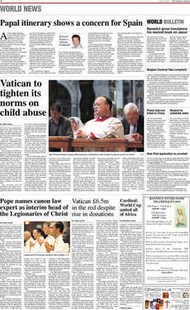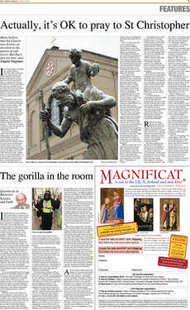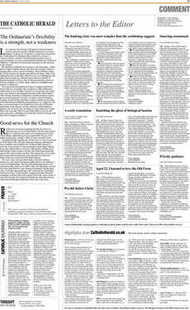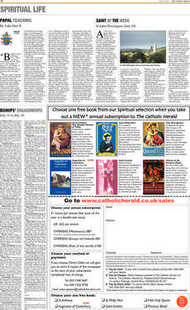Page 8, 16th July 2010
Page 8
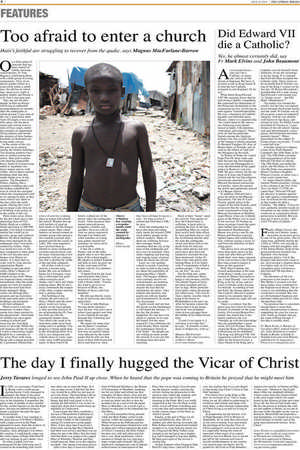
Report an error
Noticed an error on this page?If you've noticed an error in this article please click here to report it.
Tags
Share
Related articles
A Papal Trip Would Glad Hearts In The North A Secret...
In A Few Words
The 'queenliest Tower'
T Ilatariimai L
Did Edward Vii Become Catholic?
Virginity Is Old Hat, But Fish Forks Are Still U...
Did Edward VII die a Catholic?
Yes, he almost certainly did, say
Fr Mark Elvins and John Beaumont As everyone knows, you can’t be a Catholic, or marry one, and sit on the throne of England. We have to go back as far as King James II to find the last Catholic monarch to rule England. Or do we?
What about King Edward VII? We certainly know that he had strong Catholic sympathies. He expressed his detestation of the Protestant declaration in the coronation service, involving an oath against Transubstantiation. He was a champion of Catholic equality and attended many Masses, where it is reported that “he would stand in the sanctuary following every detail, missal in hand, with attention, veneration, and respect”. Moreover, he had no particular friends among the Anglican bishops, but was a close friend of the famous Catholic preacher Fr Bernard Vaughan SJ; also, of Henry Duke of Norfolk, and of such as the Abbot of Tepl and the Marquess de Soverall.
As Prince of Wales he visited Pope Pius IX three times and later became the first English king since the Plantagenets to cross the threshold of the papal palace in Rome to visit Leo XIII. He gave money for the upkeep of at least one Catholic church and the last big religious function he attended was the Blessed Sacrament procession at Lourdes, where he entered the grotto and apparently prayed at La Roque church.
In addition, Edward had a great devotion to the Blessed Sacrament. The late Fr Cyril Forster, parish priest at the chapel of the Irish Guards, used to recount that he was sometimes summoned to bring the Blessed Sacrament to Marlborough House when any Catholic guest of the Prince was in need of his services. Fr Forster on these occasions found the gates open before him and at the threshold of Marlborough House was always met by the Prince and Princess carrying lighted tapers and conducting him, without saying a word, to and from the bedroom of their ailing guest.
The above facts are perhaps more than mere straws in the wind, and after Edward VII’s death there were many rumours of his conversion to the Church. But what actual evidence is there on this question?
Well, Paul Cambon, the French ambassador at the time of the King’s death, was summoned by Queen Alexandra to pay a final friendly visit to the King as he lay dying, and noticed a Catholic priest leaving his bedside. According to Gerard Noel, the former editor of The Catholic Herald, Cambon noted in his memoirs that he knew the priest by sight, but not by name.
There is evidence that the priest may have been Fr Forster himself. A member of the same family, Dr Lavinia Braun-Davenport, has stated that in her family tradition she was “brought up with the knowledge that my grandmother’s great uncle, Fr Cyril Forster, had converted the King of England to Catholicism on his deathbed”. The king was Edward VII. The suggestion is that Fr Forster was taken by Sir Ernest Cassel, a close friend of the King and a Catholic convert himself (from Judaism), to see the sovereign as he lay dying. It is claimed that Edward there accepted the Catholic faith. There seems to be no doubt that Fr Forster was one of the King’s visitors on his last day. Dr Braun-Davenport’s grandmother left a note saying that Edward’s conversion was “a ‘family secret’ – the Old Rake’s Repentance”!
The matter was treated discreetly, but the lore was passed down through the Forster family just the same. Fr Forster was by all accounts a man of respected integrity. And he was already well known to the King, and trusted by him. Sir Shane Leslie described Fr Forster as “a gentleman of the old school, hating cant and advertisement, courageous, old-fashioned and transparently honest”. When questioned on the subject Fr Foster always answered: “I wish I could tell you.” A further strand of evidence comes from Niall Diarmid Campbell, the 10th Duke of Argyll. The 10th Duke certainly told acquaintances of his that Edward VII died a Catholic. The 10th Duke succeeded his uncle, the 9th Duke, in 1914. The 9th Duke was married to Queen Victoria’s daughter, Princess Louise, so there was a close court connection.
Fr. James Martin Gillis, the famous Paulist preacher, writing in his column in the New York News on April 13 1936, declared that: “Edward VII had the decency to protest against the oath against Transubstantiation. In reward for his courage in that matter, he died a Catholic.” He added: “I have direct, authentic reliable inside information on the matter which I could not as a journalist obtain permission to publish. But you may put it down as fact – Edward VII died a Catholic.” Finally, Philip Trower, the writer on Catholic issues, describes an account given by one of his great aunts, who at some time, probably during the 1920s or 1930s, was staying in Vienna with her daughter, wife of Dr Alfons Huber, head of the great psychiatric hospital Am Steinhof. Two German princesses paid a visit to the hospital and afterwards came to tea. To everyone’s surprise these two ladies said, as if it were something quite well known, that Edward VII had died a Catholic.
The identities of the two princesses is not known, but Mrs Huber’s account was that these ladies were connected to the English royal house. The account is not something that she would have invented. She was an old-fashioned Anglican and had been rather put out by what she had been told.
The position then is uncertain, though there is more than merely circumstantial evidence supporting the case for conversion. Some go further and say the same of King George V – but that is another story.
Fr Mark Elvins is Warden of Greyfriars Hall, Oxford University. John Beaumont is author Roads to Rome: A Guide to Notable Converts from Britain, published by St Augustine’s Press (www.staugustine.net)
blog comments powered by Disqus





